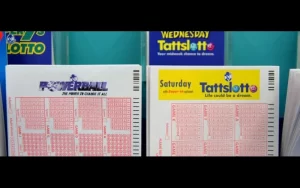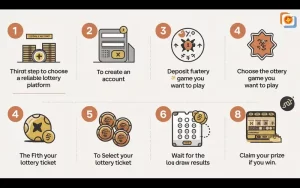82 Lottery Fraud is a pervasive issue that has affected countless individuals worldwide. It often takes on various forms, including scams via email, phone calls, and even social media. As the excitement of winning a lottery can cloud judgment, many fall victim to these deceptive schemes. This article will explore the different types of 82 Lottery Fraud, how they operate, and most importantly, provide valuable tips to help you recognize and avoid falling prey to these scams.
Understanding 82 Lottery Fraud
Lottery fraud refers to deceptive schemes that exploit the trust of individuals by falsely claiming they have won a lottery or sweepstakes. These fraudulent activities can take many forms, and understanding them is crucial for protecting yourself from falling victim.
What Is 82 Lottery Fraud?
82 Lottery Fraud involves deceitful schemes where perpetrators falsely claim that individuals have won a lottery or sweepstakes. The objective is to trick victims into providing personal information, paying fees, or transferring money to the fraudster. These scams can occur at any time and can be highly sophisticated, making it challenging for the average person to distinguish between legitimate lotteries and fraudulent schemes.
Common Types of 82 Lottery Fraud
Lottery fraud can take many forms, targeting unsuspecting individuals and often causing significant financial loss. Here are some common types of lottery fraud:
- Phishing Emails: Scammers often send emails that appear to be from legitimate lottery organizations. These emails typically include official logos and branding to create an illusion of authenticity. They may ask you to click on links or provide personal information.
- Phone Scams: In this scenario, fraudsters call individuals and claim they have won a lottery. They often ask for verification of personal information or request payment for taxes or fees before the “winnings” can be released.
- Social Media Scams: As social media platforms have grown, so have scams. Fraudsters create fake lottery accounts that promise huge payouts for minimal investment or ask individuals to share their personal details for a chance to win.
- Prize Promotion Scams: In these scams, victims are informed they have won a prize from a promotion they never entered. To claim the prize, they must pay fees or provide sensitive information.
- International Lottery Scams: Scammers often claim that individuals have won a foreign lottery. They may ask for payment to cover taxes or other fees before the winnings can be released.
How 82 Lottery Fraud Scams Operate
Scammers use various tactics to make their schemes seem credible. They often utilize:
- Official-Looking Documents: Scammers produce fake checks, tickets, or forms that mimic legitimate lottery materials.
- Urgency: They create a sense of urgency, claiming that the offer is time-sensitive, pressuring victims to act quickly without considering the details.
- Emotional Appeals: Scammers play on the emotions of victims, making them believe they are just a step away from life-changing winnings.
How to Protect Yourself
Protecting yourself from lottery fraud is essential, especially as scams become increasingly sophisticated. Here are some key strategies to help you stay safe:
- Be Skeptical of Unexpected Wins: If you didn’t buy a ticket, you can’t win. Don’t trust claims that you’ve won a lottery you didn’t enter.
- Verify the Source: Check the official lottery website or contact them directly to confirm any winning claims.
- Beware of Fees: Legitimate lotteries do not require payment to claim a prize. If someone asks for fees or taxes upfront, it’s likely a scam.
- Watch for Pressure Tactics: Scammers may try to rush you into making decisions. Take your time and don’t feel pressured.
- Use Official Channels: Only buy lottery tickets from authorized retailers or official lottery apps.
Understanding how these scams operate is crucial in identifying and avoiding 82 Lottery Fraud.
Recognizing the Red Flags of 82 Lottery Fraud
Recognizing the red flags of lottery fraud is essential to protect yourself from scams. Here’s a breakdown of the key indicators to watch out for:
You Didn’t Enter a Lottery
If you receive notification about winning a lottery that you didn’t enter, this is a significant red flag. Legitimate lotteries only award prizes to individuals who have purchased tickets or entered their contests.
Requests for Payment
If you receive notification about winning a lottery that you didn’t enter, this is a significant red flag. Legitimate lotteries only award prizes to individuals who have purchased tickets or entered their contests.
Pressure to Act Quickly
Scammers often create a false sense of urgency. If you feel rushed to make a decision or provide information, it’s essential to take a step back and evaluate the situation carefully.
Generic Greetings
Many fraudulent communications use generic terms like “Dear Winner” instead of your name. Legitimate organizations will typically address you by your full name and provide specific details.
Inconsistent Contact Information
If the contact information provided appears suspicious or does not match that of a legitimate organization, it could be 82 Lottery Fraud. Verify any claims by checking official lottery websites or contacting them directly.
Poor Grammar and Spelling
Fraudulent communications often contain spelling and grammatical errors. Legitimate companies typically maintain high standards of professionalism in their correspondence.
Tips to Avoid Falling for 82 Lottery Fraud
Falling victim to lottery fraud can be devastating, especially with schemes like the “82 Lottery” scam. Here are some tips to help you avoid such scams:
Educate Yourself About Scams
The first line of defense against 82 Lottery Fraud is education. Familiarize yourself with common scams and the tactics used by fraudsters. The more you know, the better equipped you will be to spot a scam.
Verify the Source
If you receive a notification about winning a lottery, verify the source. Check official lottery websites or contact their customer service to confirm the legitimacy of the claim.
Never Share Personal Information
Be cautious about sharing personal information, especially sensitive details like your social security number, bank account information, or credit card details. Legitimate lotteries will not ask for this information via email or phone.
Use Secure Payment Methods
If you ever need to make a payment, use secure methods such as credit cards or reputable payment platforms that offer buyer protection. Avoid wire transfers or sending cash, as these methods provide little recourse if you are scammed.
Consult Trusted Friends or Family
If you receive a suspicious message or call, discuss it with friends or family. They may provide a different perspective and help you recognize potential 82 Lottery Fraud.
Report Suspicious Activity
If you encounter a lottery scam, report it to local authorities and organizations that track fraud, such as the Federal Trade Commission (FTC) in the U.S. Reporting these scams can help protect others from becoming victims.
Stay Skeptical
Always approach unexpected notifications with skepticism. If something sounds too good to be true, it probably is. Trust your instincts and take the time to research any claims before acting.
Keep Software Updated
Ensure that your devices have updated security software to protect against phishing attempts and other cyber threats. Keeping your software current can help you avoid falling victim to 82 Lottery Fraud.
Legal Consequences for 82 Lottery Fraud
Engaging in 82 Lottery Fraud can have severe legal consequences. Fraudsters face significant penalties, including hefty fines and prison sentences. In many jurisdictions, the law takes a strict stance against fraud to protect individuals from falling victim to such schemes.
What to Do If You’ve Been Scammed
If you’ve fallen victim to lottery fraud, it’s important to take immediate action to protect yourself and potentially recover your losses. Here’s a step-by-step guide on what to do:
Stop All Communication
If you suspect you’ve fallen for 82 Lottery Fraud, Cease all contact with the scammers immediately. Do not respond to calls, messages, or emails.
Disconnect from the Internet
If you suspect malware, disconnect your device from the internet to prevent further damage.
Document Everything
Gather all relevant information about the scam, including:
- Emails or messages you received
- Phone numbers used by the scammers
- Any personal information you provided
- Details of the scam, including dates and amounts involved.
Notify Your Bank or Financial Institutions
If you provided any financial information, contact your bank or credit card company immediately. They can help protect your accounts and may advise you on the next steps:
- Freeze your accounts
- Dispute any unauthorized transactions
- Monitor for suspicious activity.
Monitor Your Financial Accounts
Monitor your credit report for any new accounts or unusual activity. You can request a free report from each of the major credit bureaus once a year at AnnualCreditReport.com.
Place a Fraud Alert or Credit Freeze
Both options are simple to initiate, and you can do so by contacting one of the three major credit bureaus. Here’s what you need:
- Consider placing a fraud alert on your credit report, which can make it harder for scammers to open accounts in your name.
- Alternatively, you can freeze your credit, preventing any new accounts from being opened until you lift the freeze.
Stay Informed
Educate yourself about common scams to avoid falling for similar schemes in the future. Awareness is key in preventing further fraud.
Seek Support
If you’re feeling overwhelmed or stressed, consider reaching out to support groups or professionals who can help you cope with the emotional impact of being scammed.
Be Cautious of Recovery Scams
If you receive calls or messages claiming they can help you recover lost funds, be wary—these can be scams themselves. Always verify the legitimacy of such offers before engaging.
Consider Legal Action
Depending on the severity of the scam and your losses, you might want to consult with a legal professional to explore your options.
FAQs
How do scammers contact potential victims?
Scammers usually reach out via phone, email, text messages, or social media, often impersonating legitimate lottery organizations or officials.
Can legitimate lotteries ask for payment to claim a prize?
No, legitimate lotteries will never ask winners to pay any fees upfront. Taxes or other payments are usually deducted from the prize or paid directly to authorities after you receive your winnings.
Why do scammers ask for my personal information or payment?
Scammers request personal information or payment to steal your identity or to make money from fake processing fees. Never share personal details like your bank account or social security number.
Are international lotteries a red flag?
Yes, if you’re contacted about winning a foreign lottery that you never entered, it’s likely a scam. Most legitimate lotteries are region-specific, and it’s illegal for foreign lotteries to solicit entries in many countries.
Can I recover money lost to lottery fraud?
In most cases, it’s very difficult to recover money once it’s sent to scammers. However, you should report the incident to authorities, who may be able to help in certain circumstances.
For more tips on how to avoid scams and protect your winnings, visit our website today! 82 Lottery







